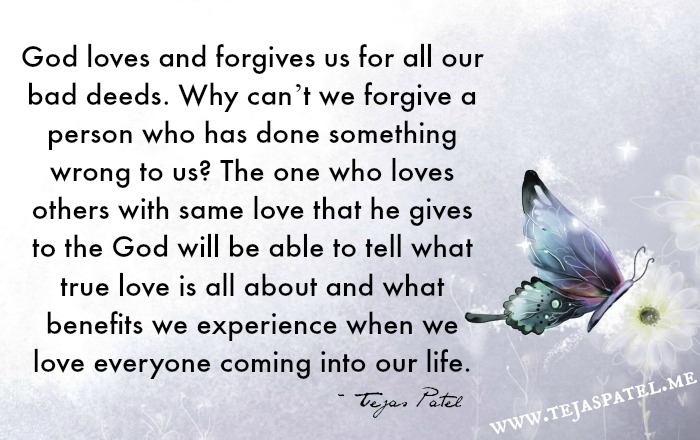God loves and forgives us for all our bad deeds. Why can’t we forgive a person who has done something wrong to us? The one who loves others with same love that he gives to the God will be able to tell what true love is all about and what benefits we experience when we love everyone coming into our life. ~ Tejas Patel
The Power of Forgiveness: Unleashing True Love and Unconditional Acceptance
Forgiveness is a powerful tool that can transform our lives in profound ways. It’s a concept that’s often discussed in spiritual and philosophical circles, but it’s also essential for building strong, meaningful relationships with others. As the quote above so eloquently puts it, “God loves and forgives us for all our bad deeds. Why can’t we forgive a person who has done something wrong to us?” In this article, we’ll explore the importance of forgiveness, its benefits, and how it can help us experience true love and unconditional acceptance.
The Benefits of Forgiveness
Forgiveness is not just about letting go of past hurts or resentments; it’s also about releasing the negative emotions that come with them. When we hold onto anger, resentment, and bitterness, it can consume our lives and make us miserable. Forgiveness, on the other hand, can bring a sense of peace, freedom, and liberation. Here are some of the benefits of forgiveness:
- Reduces stress and anxiety: Holding onto resentment can be a heavy emotional burden, but forgiveness can help alleviate that stress and anxiety.
- Improves relationships: Forgiveness can help repair and strengthen relationships by releasing negative emotions and promoting understanding and empathy.
- Improves physical health: Studies have shown that forgiveness can have a positive impact on physical health, reducing symptoms of depression, anxiety, and chronic pain.
- Increases self-awareness: Forgiveness requires self-reflection and introspection, which can increase self-awareness and help us develop a greater understanding of ourselves and others.
The Concept of True Love
True love is not just about romantic feelings or passion; it’s about unconditional acceptance, compassion, and empathy. It’s about loving others without expecting anything in return or judging them for their mistakes. When we love someone with this kind of love, we’re not just loving them for who they are; we’re also loving them for who they’re becoming. Here are some key characteristics of true love:
- Unconditional acceptance: True love accepts people for who they are, without judgment or condition.
- Compassion: True love is compassionate and empathetic, understanding that everyone makes mistakes.
- Empathy: True love puts itself in others’ shoes and tries to understand their perspective.
- Selflessness: True love is selfless, putting the needs of others before one’s own.
Practicing Forgiveness
Forgiveness is a process that requires effort, intention, and practice. Here are some steps you can take to practice forgiveness:
- Identify the source of your pain: Recognize the source of your pain or resentment and acknowledge its impact on your life.
- Let go of negative emotions: Release negative emotions such as anger, resentment, and bitterness.
- Practice self-reflection: Reflect on your own role in the situation and how you can grow from it.
- Seek forgiveness from others: If you’ve been hurt or wronged by someone else, seek forgiveness from them.
- Practice self-forgiveness: Forgive yourself for your own mistakes and shortcomings.
Conclusion
Forgiveness is a powerful tool that can transform our lives in profound ways. By practicing forgiveness, we can release negative emotions, improve our relationships, and experience true love and unconditional acceptance. Remember that forgiveness is not just about forgetting what happened; it’s about releasing the pain and resentment associated with it. By embracing forgiveness, we can live more peaceful, fulfilling lives and experience the joy and freedom that comes from letting go of the past.




